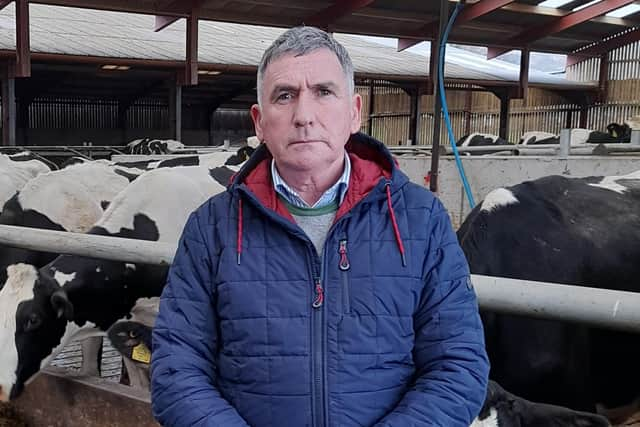‘No one is listening’ - Hill sheep farmers have been raising plight for years
and live on Freeview channel 276
Politicians met with farmers at Sean Fitzpatrick’s farm in Moyadd, Kilkeel, last Friday where they discussed challenges including hill grazing issues and the climate change bills currently making their way through Stormont.
The meeting was presented by the Ulster Farmers’ Union and NI Agriculture Producers’ Association.
Advertisement
Advertisement
UFU and NIAPA officials raised the issue of recent fires on the mountains and asked the attendees if they had any ideas that would support the prevention of these fires.


TUV councillor, and South Down assembly candidate, Harold McKee, said the farmers who graze the hills were best placed to answer that question.
“A number of farmers who spoke on the subject said the problem lies with the environmental agencies,” Cllr McKee stated.
“A number of years ago they were told to take the sheep off the mountain to avoid overgrazing, or at least reduce the sheep numbers.
Advertisement
Advertisement
“It didn’t matter how many times they told them, this is not a good idea because new generations of sheep must be returned to the mountain every year so they can continue to adjust to their own grazing area.
“A few years later they were told by the Northern Ireland Environment Agency to return the sheep to the hills but, this time, with a less hardy sheep, a breed that was more familiar to lowland grazing.
“This proved unworkable as these sheep couldn’t adapt to mountain pastures and always looked to get back to lowland grazing.”
Cllr McKee continued: “Other farmers explained that part of the reason we have fires on the mountains is that the rough terrain is undergrazed - the grass grows in the springtime and, if it is not grazed in the summertime, it will dry out and create the ideal fuel for someone who is careless with naked flames.
Advertisement
Advertisement
“If protection is needed, it should be controlled burning of whin bushes and gorse, which will reduce the number of wild fires.
“A sheep farmer who attended said the meeting was unnecessary because all this information had been presented to the authorities years ago and was never acted upon, no one is listening.”
The Mourne representative said he had a “great deal of sympathy” with this point.
“Discussions were similar to those I listened to almost 20 years ago when I attended numerous ‘No National Park’ meetings as deputy leader of the Mournes Area of Outstanding Natural Beauty Residents Action Group (MAONBRAG),” he explained.
Advertisement
Advertisement
“Having listened to the hill sheep farmers raising this plight for years of undergrazing and the detrimental impact it was having on the hillside, proves what they were saying was right.”
The issue of climate change bills was discussed, with the Private Member’s Bill debate dominating the remainder of the meeting.
“All farmers who spoke on the bill raised their concerns about the 100 per cent reduction of zero emissions by 2045,” Cllr McKee said.
“There was a major concern that the figures produced from the KPMG report, which was produced on behalf of the UFU, showed there could be as much as a 50 per cent reduction in the production of livestock.
Advertisement
Advertisement
“I reminded the farmers of the livestock reduction by 2045 - 1.2million beef cattle, 1.7 million sheep and 270,000 dairy cattle.
“This equates to 14,500 less favoured area farms and 4,500 lowland farms ceasing production.
“Where are all the sheep coming from to graze the mountains?” Cllr McKee ended.